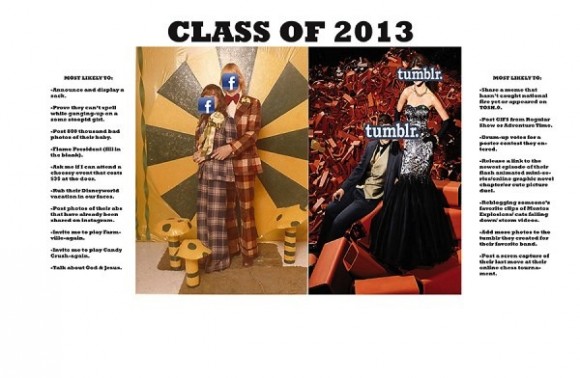aNewDomain.net — As teens and tweens continue to desert Facebook in favor of microblogging platform Tumblr, our Viki Reed provides some perpective on what, how and why.
I remember the day I first considered using Facebook. It was 2006 and I had just heard about 17-year-old Ashley Qualls of Detroit — arguably the first teen online millionaire as a result of creating MySpace layouts for fellow teens.
Qualls’ basement-run home business, WhateverLife, was generating serious traffic when ValueClick’s Ian Moray spotted it on a lark. He brokered a deal with Qualls to sell ads on her website. At some point after the ads appeared, Google Analytics showed that WhateverLife was attracting as many as 60 million page views per month. Qualls received many offers from buyers interested in the site. She turned them all down.
It was in the heydey of MySpace. Those days, if you were a teen, or if you had a hobby or a home business to share, you had a MySpace page.
Then came Facebook.
It wasn’t until April 16, 2007 — the day of the Virginia Tech Massacre — that Facebook really entered the American social consciousness. That killing spree contributed greatly to Facebook’s transformation from an insiders-only college club to a globally-recognized platform.
On April 16, every news station in the country displayed screenshots of Facebook pages. There were shots of students looking for their classmates, Facebook pages showing the shooter’s comments and photos, security alerts from university staff, and parents desperately begging for responses from their Virginia Tech kids. Finally, there were the online condolences. The tragedy resulted in a university-wide, Facebook-based alert system.
Through humble Facebook posts, all this pain, anguish and desperation was distilled and broadcast. The irrelevance of a single voice began to take real meaning, and for Facebook the reaction was pivotal.
Before this, Facebook was primarily used by college kids and their families, or stay-at-home moms. The massacre gave Facebook a real-world test run. Five years, one month and 2 days later Facebook went public. The name Zuckerberg became as iconic as those of Microsoft founder Bill Gates or Apple co-founders Steve Wozniak and Steve Jobs.
Now, in 2013, we see teens and tweens backing away from Facebook and migrating to Tumblr. Tumblr isn’t perfect, but it is a good place to experience public opinion and even have a few ongoing disputes. So the cadence of responses isn’t like Facebook at all.
 Image credit: Viki Reed for aNewDomain.net
Image credit: Viki Reed for aNewDomain.net
Teens and tweens find the online rooms and forums they want to feed their heads, expand their minds and just be themselves. They find this with Tumblr. Mom and Dad may not look at Tumblr, but smart teachers know and check in on student accounts.
So what makes Tumblr attractive to teens? It’s light, fast and easy to use. It feels subversive, allowing intimate friend groups to organically form. It’s commercial free, feels more secure because of its lack of a native comment feature for posts, and the site is rarely down.
Tumblr is for kids who run to their smart device or desktop before school, right after school, and then they count sheep with their Tumblr blog.
They just want to dive into people like themselves who celebrate similar interests. They want friends who act like friends. There is some bullying on Tumblr, true, but not to the extent we’ve seen on Facebook.
Tumblr has a setting that encourages you to upgrade to get your post or blog seen by more eyes. You never see it unless you know it’s there.
Facebook is simply too big. Every home business, major corporation, media entity, sociopolitical group, and political faction has a Facebook page. With a reach so broad it’s hard to be seen as an intimate universe. Tumblr, on the other hand, adds a layer of kinship and fan-club enthusiasm to the lives of those who do have armies of living breathing friends.
Last I checked, Ashley Qualls is doing just fine with her own clothing line, replete with a Twitter account and a Facebook biz page.
She doesn’t have a Tumblr blog, but then maybe she’s too old. She’s 23 now.
Based in New York, Viki Reed is a senior photographer and pop culture commentator at aNewDomain.net. She’s worked with SubBrilliant News, Anti-Press and Thewax. Check out her work at vikireedphotography.com and email her at Viki@aNewDomain.net or viki@vikireedphotography.com.












